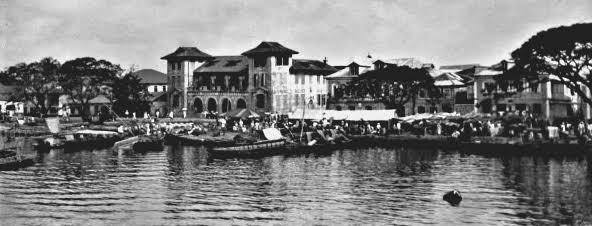Back to: History Primary 5
Hello, young historian! Welcome to another exciting journey through Nigeria’s past. Today, we will learn about how the British conquered Southern Nigeria between 1880 and 1905. This is a story of battles, treaties, and resistance. Ready? Let’s begin!
1880 – 1905: The British Conquest of Southern Nigeria
Imagine playing a game where a bigger team comes and takes over your playground, claiming it as their own. This is similar to what happened in Southern Nigeria when the British took control of different kingdoms, towns, and regions. But why did they do this? And how did the local rulers and people react? Let’s find out!

The British Expansion in Southern Nigeria
During the late 19th century, the British wanted full control over Southern Nigeria for three main reasons:
- Trade and Economy: The region was rich in palm oil, ivory, and other valuable resources. The British wanted to control these resources and trade routes.
- Stopping the Slave Trade: Although the slave trade was officially abolished, the British wanted to ensure it did not return.
- Colonial Rule: Britain was competing with other European powers to control parts of Africa. By conquering Southern Nigeria, they could expand their empire.
Key Conquests and Events
- The Conquest of Lagos (1861): Before 1880, the British had already taken control of Lagos, an important trading hub. They used it as a base to expand their influence.
- The Ijebu Expedition (1892): The Ijebu people did not allow British missionaries and traders into their land. In response, the British attacked and defeated them, forcing them to surrender.
- The Benin Expedition (1897): The British attacked the Kingdom of Benin, exiled the Oba (king), and looted the famous Benin Bronzes.
- The Aro Expedition (1901 – 1902): The Aro people were powerful traders in Igboland. The British accused them of being involved in the slave trade and launched a military attack to defeat them.
- Final Control (1905): By the early 1900s, the British had taken over most of Southern Nigeria. Some local rulers resisted, but the British had stronger weapons and military forces.

Impact of the Conquest
- End of Traditional Kingdoms: Many powerful rulers, like the Oba of Benin and Aro leaders, lost their authority.
- British Rule Began: The British introduced their government, laws, and trading systems.
- Colonial Economy: The British focused on cash crops like palm oil and cocoa, changing how people farmed and traded.
Conclusion
The conquest of Southern Nigeria was a turning point in history. It marked the beginning of British colonial rule, which later led to Nigeria’s unification in 1914. While some Nigerians resisted, the British had the advantage of modern weapons and better military organisation.
Evaluation
- Why did the British want to control Southern Nigeria?
- Name two major battles that took place during the conquest.
- What happened to the Oba of Benin in 1897?
Well done, young historian! You are doing great in learning about Nigeria’s past. Keep exploring, stay curious, and remember—history helps us understand the present! See you in the next lesson.
